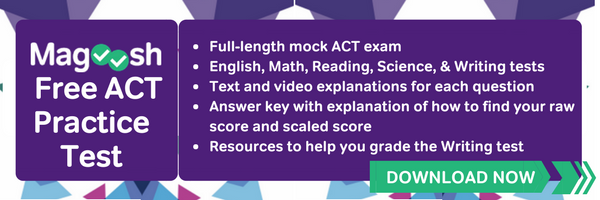3 min read
How School Counselors can Help Prepare Students for the ACT
![]() Nadyja Von Ebers
:
Jan 23, 2018 9:00:00 AM
Nadyja Von Ebers
:
Jan 23, 2018 9:00:00 AM

We tend to think of ACT prep as a teacher’s job, but a school’s college counselor can also be highly beneficial to students in the ACT prep process. So how exactly can you as an ACT counselor take steps to ensuring students' preparedness and success on the test? Let’s take a look.

Talk About ACT Scores and College
Chances are that any students taking the ACT have already met with you to talk about the college application process. When helping students find and select appropriate colleges to apply to, there are obviously many factors to take into consideration: potential majors, financial aid, location, and of course, admissions requirements, including but not limited to GPA and ACT scores. Having some colleges in mind going into the ACT can help motivate students to do well on the test, so have important conversations about colleges before they take their first test, even if this feels a bit early.
Your goal is to help students find colleges that they are both excited about, and that they have a decent chance of getting into (even if some choices are ambitious long-shots). In order to help them select viable colleges before they take the ACT, you can look at pre-test scores from earlier grade levels, practice tests completed in class, and academic grades/GPA to get a sense of which colleges to aim for.
Once test scores are in, you can take a more pointed approach to helping students find which colleges to aim for based on their ACT scores and percentiles. You can also help them determine and set reasonable goals for increasing their ACT scores if some of their schools of interest are out of their current range.
Provide ACT Test-Taking Strategies
While teachers prepare their students for the ACT content-wise, ACT counselors can help greatly by leading sessions on test-taking strategies, either outside of class or during periodic class visits.
ACT counselors can provide valuable information and tips about ACT test-taking strategies in general, and for each of the subject area tests. For example, you can cover topics such managing time, eliminating answers, taking notes, guessing, etc.
Help with ACT Anxiety Management
Really, it’s all hands on deck when it comes to helping students reduce their test anxiety: teachers, guidance counselors, and college counselors can all be integral resources.
We’ve discussed ACT stress management techniques before, but in addition to techniques like deep breathing and stretching, the best thing an ACT counselor can offer students to diminish their stress is a sense of preparedness in general, and a peace of mind about applying to college.
The more college options that students are aware of, the less do-or-die the test will seem to them. Help students understand that their test score is only one (albeit important) piece of their application materials, and that there are schools that admit students at nearly every percentile. College acceptance pressure can overwhelm students at test time, so the less pressure they feel to get an exact score or get into one specific school, the better they will be able to manage their anxiety.
Interpret ACT Data and Advise Instructors
Examining ACT school reports to see how your student body compares to other ACT-takers at the state and national level can give you a valuable perspective on which subject areas and topics need more practice in the classroom. Counselors can serve as the link between upper administration and teachers in communicating students’ strengths and weaknesses, and help modify curriculum accordingly.
Advocate for At-Risk Students Taking the ACT
“At-risk” refers (in this context) to students who are at risk of not passing the ACT. They are likely also doing poorly in their academic classes, placing them at risk of not getting into college. In addition to providing in-class instruction on test-taking strategies, counselors can also lead individual or small group sessions for at-risk students, where content can be broken down more slowly and thoroughly. Counselors can also help determine which students may need more intensive ACT prep or ACT tutoring.
Facilitate ACT Accommodations
The ACT provides test accommodations to students with documented disabilities, and ACT counselors can serve as facilitators to secure these accommodations for students who qualify for them. The ACT also provides English Learner Supports to students with limited English proficiency, for which students may also need help applying. Counselors can help answer students’ questions about accommodations, help fill out paperwork, discuss accommodations with parents, etc., in order to ensure that students receive the necessary support to succeed on the ACT.
A Final Word
Overall, counselors can be another important line of support for students preparing for the ACT, especially since they are the gatekeepers of the college application process. Ask your administration and faculty how you can best help prepare your student body for the ACT, and boost results across the board.
Do you have any advice to share with fellow educators? Let us know in the comments below!


